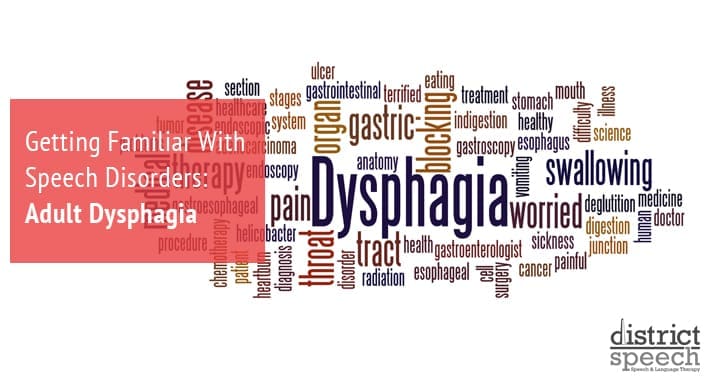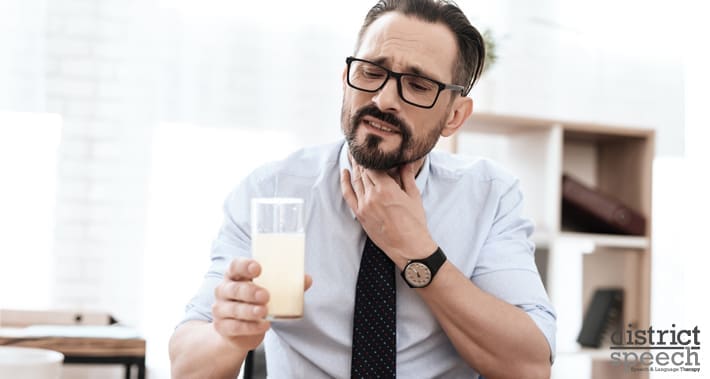
Most people take being able to eat or drink without difficulty for granted.
It’s often considered to be as natural a process as breathing.
However, when an individual has difficulty swallowing, it can lead to pain, malnutrition and embarrassment for those affected.
Plus, when you break down the process, like breathing, it is actually a lot more complex than you might first think.
Today we are going to take a look at adult dysphagia, and swallowing disorder treatment for adults.
Keep reading to learn more.
What Is Adult Dysphagia?
Dysphagia is a disorder which impacts the ability of an individual to swallow.
It can affect the oral cavity, pharynx, esophagus, or gastroesophageal junction, which is the border between your oesophagus and stomach.
Individuals with dysphagia may lose the ability to enjoy food and drinks which they previously ate or drank without issue.
Because it impacts the ability to swallow, it can also lead to dehydration and malnutrition.
As you can imagine, this negatively impacts your quality of life.
What Are The Symptoms Of Adult Dysphagia?
Some of the symptoms of adult dysphagia include:
- Inability to chew effectively
- Drooling
- Malnutrition and/or weight loss due to inability to eat enough food
- Food leaking from the mouth due to inability to keep the mouth closed
- Changes in eating habits
- Throat clearing or coughing after eating and drinking
- Inability to swallow food or drink completely
- Taking extra time to swallow
- The feeling of food sticking in the neck or throat area
- Pain when swallowing
- Voice changes (“gurgled” sounding) while eating or drinking
- Trouble coordinating swallowing and breathing at the same time
- Aspiration pneumonia
- Avoidance of certain foods
- Slurred speech – strokevictims are especially prone to this
- A new stutter in adults – while dysphagia is not what causes stuttering in adults, the two can be connected
Over time, if your dysphagia persists without treatment, you can also become prone to repeated chest infections.
It should be noted not all of these signs will be present in all cases of dysphagia.
What Causes Adult Dysphagia?
Generally speaking, the most common cause of adult dysphagia is a mechanical esophageal disorder.
This type usually affects swallowing solid foods, and over time can lead to difficulty swallowing liquids.
If you find that you’re having difficulty swallowing both liquids and solids, it often points to an underlying motility disorder, like gastroesophageal reflux disease, which often causes heartburn.
Adult dysphagia may also be due to nerve damage, including that of the central nervous system, or cranial nerves, or due to issues which affect the head and neck.
Nervous system causes can include:
- Traumatic brain injury
- Polymyositis (inflammatory disease which leads to muscle weakness)
- Dermatomyositis (inflammatory disease characterized by a skin rash)
- Stroke
- Myasthenia gravis (autoimmune disorder affecting communication between nerves and muscles)
- Spinal cord injury
- Dementia
- Post-polio syndrome
- Developmental disability
- Parkinson’s disease
- Muscular dystrophy
- Multiple sclerosis
Conditions which affect the head and neck may include:
- Having undergone intubation or tracheostomy
- Cancer of the mouth, head, or neck
- Chemotherapy or radiation treatments for cancers of the mouth,head, or neck
- Surgery of the head or neck
- Missing teeth
Other factors which can lead to dysphagia include:
- Frailty
- Decompensation
- Side effects of certain medication
- Cardiothoracic surgery
- Metabolic disturbances
- Infectious disease
- GERD (gastroesophageal reflux disease)
- Heart disease
How Can Speech Therapy Help With Adult Dysphagia?
If someone has adult dysphagia, a speech therapist can offer interventions to help support their ability to eat and drink, improve quality of life, and develop a plan to provide treatment for the condition.
Let’s take a look at some ways a speech therapist can help.

1. Swallowing Exercises
These exercises work the tongue, jaw, lips, soft palette, larynx, and pharynx with the goal being to restore and improve the function of the muscles which control swallowing.
Exercises may include range-of-motion activities, resistance, sensory stimulation, and exercises which mimic chewing or swallowing motions.
2. Maneuvers
Maneuvers can be used to modify the strength and timing of movements used in swallowing.
One example is the Mendelsohn maneuver, which focuses on elevating the larynx and opening the esophagus during swallowing – this prevents food from entering the airway.
Another example is the supraglottic swallow, which involves holding one’s breath to protect the airway before and after swallowing.
3. Diet Modifications
When an individual has difficulty swallowing, certain foods may be easier to eat than others.
Modifying food texture, consistency, and viscosity can make it easier and safer for individuals with dysphagia to eat.
This may include chopping, pureeing, or softening solid foods, and modifying the viscosity of liquids.
Changes to temperature and taste of foods may also help.
4. Posture Modifications
If you’ve ever tried to eat or drink while laying down, you’ll know posture can make a difference in how easy or difficult it is to swallow.
Postural changes can include techniques such as tucking the chin down towards the chest and neck to reduce aspiration.
Conversely, tilting the chin upwards can aid movement of food and saliva from the mouth to the esophagus.
Lateral head rotation can also aid swallowing.
5. Other Possible Strategies
Other ways to help individuals with dysphagia to be able to swallow can include:
- Use of prosthetics
- Sensory stimulation
- Biofeedback
- Electrical nerve stimulation
- Strategies involving pacing of food
- Medical interventions, such as anti-reflux medications
Book Your Appointment With District Speech Today
Are you recovering from a stroke or traumatic injury and having difficulty enjoying food the way you used to?
Has cancer radiation treatment left you unable to swallow properly?
Or maybe you are a caregiver for an individual who is suffering from dysphagia.
At District Speech, we offer speech therapy in Washington DC and and we can help.
Contact us today for more information about our services, or to set up an appointment.
Book your appointment with District Speech today.
1300 I St NW, Suite 400 E,
Washington, DC 20005
- https://g.page/districtspeech
District Speech and Language Therapy specializes in speech therapy, physical therapy, and occupational therapy solutions, for both children and adults, in the Washington D.C and the Arlington Virginia areas.